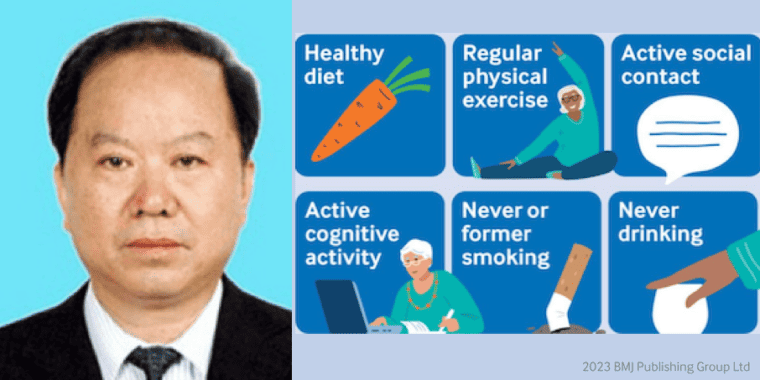
Memory decline is a common issue among old adults, which can be affected by various factors, according to the literature. In this prospective study in the BMJ, we aimed to identify the association between healthy lifestyle and memory decline through a long follow-up period of 10 years.
We included six healthy lifestyle factors:
- a healthy diet (adherence to the recommended intake of 7 or more of 12 eligible food items)
- regular physical exercise (≥150 min per week of moderate intensity or ≥75 vigorous intensity)
- active social contact (≥twice per week)
- active cognitive activity (≥twice per week)
- never or former smoking
- and never drinking.
We found that participants with four to six healthy lifestyle factors had slower memory decline than those with zero to one factor.
For people who carried the gene allele APOE ε4, which is the strongest risk factor gene for Alzheimer’s disease – and were therefore at high risk for dementia and memory decline – if they had four to six healthy lifestyle factors they also had slower memory decline than those with zero to one factor.
In addition, those with four to six or two to three healthy lifestyle factors were 89% and 29% less likely to develop dementia or mild cognitive impairment relative to those with zero to one factor, and the APOE ε4 group had similar results. Our results suggested adherence to a combination of six healthy lifestyle factors was associated with slower memory decline.
For alcohol consumption, we recorded the current frequency and volume of alcohol consumption, and individuals were categorised into never drinking (never drank or drank occasionally), low to excess drinking (daily alcohol consumption of 1-60 g), and heavy drinking (daily alcohol consumption >60 g).
Our results of each lifestyle factor on memory decline suggested a slightly significant association between never drinking and memory decline (the beta coefficient was 0.002, P=0.048), which suggested that compared with drinking, never drinking was associated with a slower memory decline.
Previous studies demonstrated that the risk of all-cause mortality rises with increasing levels of alcohol consumption, and the level of consumption that minimises health loss is zero. Thus, for old adults, avoiding alcohol may be a good choice for preventing memory decline.
Written by Professor Jia Jianping, Director of Alzheimer’s Disease Center, Beijing Institute for Brain Disorders.
All IAS Blogposts are published with the permission of the author. The views expressed are solely the author’s own and do not necessarily represent the views of the Institute of Alcohol Studies.
